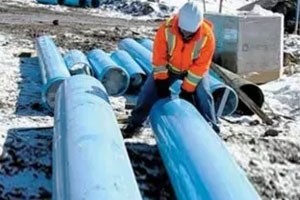Home ownership is something that almost every human being in the world strives to achieve in their lifetime.
There are many things to consider when purchasing your new home, however one question that most people do not ask is, “what types of pipes are buried under my street?”
Imagine that you recently purchased a new home to live in or to rent out as an income property and you decide to renovate your basement.
Then soon after you finish the renovation, the watermain in front of your house breaks and floods your basement with 6 feet of water.
Flooding with clean water is bad enough but imagine if instead of a watermain break, it was a sanitary sewer that broke and your basement is now filled with sanitary sewage.
You may think that this would be a rare occurrence but there are a lot of old pipes underground made from traditional rigid materials such as iron and concrete.
As these pipes get older, they corrode and break more frequently.
So unfortunately this scenario is becoming more and more common in communities across North America.
The simplest way to minimize the risk of pipe failures is to use non-traditional pipe materials that are flexible and do not corrode, such as Vinyl pipe.
In buried watermain applications, Vinyl pipe is ideal for many reasons such as:
1) Flexibility – flexible pipe will bend and flex a considerable amount before it breaks.
2) Corrosion Resistance – pipe that does not corrode will stay strong much longer than a pipe material that is susceptible to corrosion.
3) Longevity – a recent report from Utah State University gives Vinyl pipe a design life of 100+ years.
4) Smoothness – the smooth, glass-like finish of Vinyl pipe provides little surface area for bacteria to hide.
5) Strength – in a recent study conducted by Utah State University, Vinyl watermain pipe was determined to have the lowest break frequency of all pipe materials in use today in North America.
The superior corrosion resistance of Vinyl pipe is also the main reason why Vinyl is considered a clean material.
The fact that it does not corrode means that Vinyl pipe does not release any contaminants into the drinking water or the environment.
Vinyl is a stable and inert material that is non-reactive, therefore the water inside the pipe will always stay clean.
In fact many sensitive medical instruments such as blood bags and intravenous tubes that are used every day in hospitals around the world are made of Vinyl.
All of the benefits of Vinyl for watermain applications are also applicable to sewer pipe. However Vinyl has even more benefits when it comes to sanitary and storm sewers:
1) Chemical Resistance – Vinyl is resistant to many chemicals typically found in sanitary and storm sewers.
2) Bacteriological Resistance – Vinyl is completely resistant to bacteria and viruses.
3) Abrasion Resistance – Vinyl sewer pipe has superior resistance to abrasion from solid materials typically found in sanitary and storm sewers.
With all of these benefits it’s no wonder that Vinyl is the preferred pipe material for buried sewers and water mains in almost every municipality in Canada.
Furthermore, most Canadian municipalities are actively replacing their old corroded pipes with Vinyl.
So the next time you go house shopping, you may want to add one more question to your list:
What pipes are under my street?
Footnotes:
Folkman, Steven; “PVC Pipe Longevity Report – Affordability & The 100+ Year Benchmark Standard”; Utah State University, Buried Structures Laboratory; May 2014.
Folkman, Steven; “Water Main Break Rates In the USA and Canada: A Comprehensive Study”; Utah State University, Buried Structures Laboratory; April 2012.







